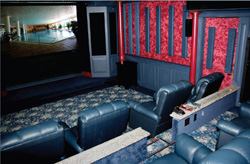In a tough market, you have to push harder, find a way to stand out from the pack, and make your company the go-to builder if you want to succeed. Ralph Corbo, president of the Corbo Group in Roxbury, Conn., is doing just that with home theater, phone systems, multi-room audio, and home networking. But unlike most builders, who bring in a third party for custom electronics, Corbo and his son handle the design, installation, and service themselves.
“Technology is absolutely a core part of what we do,” says Corbo, whose company puts up half a dozen homes a year. “Our philosophy is that these days technology should be an integral part of a new-home purchase in the same way running water began to be 100 years ago.”
For Corbo, it’s not a far leap from home building to technology. The former musician has an entrenched love for the stuff, and he and son Colin have made music distribution, video, and Internet access as standard as a Sub-Zero fridge or granite countertops. Corbo Group is even part of CEDIA, the Custom Electronics Design & Installation Association, which is to custom integrators what NAHB is to home builders.
As a CEDIA member, the Corbo Group attends the organization’s trade shows, which have become an industry launching pad for high-end music systems, TVs, video displays, and control systems. They take courses to stay on top of the rapid-fire changes that occur in the industry and have gone through CEDIA’s certification program to give an extra level of credibility to their portfolio.
The benefits of having all that time and an in-house tech operation are numerous, Corbo says. Being “the tech guy,” rather than subcontracting out a job to a third-party integrator gives Corbo control over the project and ensures a long-term relationship that’s great for word-of-mouth advertising. For customers, it means a smooth road to technology—something they might not have considered otherwise. “Being able to sit down and discuss technology needs with the buyer differentiates us from other builders in the area,” Corbo says. “The enthusiasm we have for technology, which is the same enthusiasm we have for our homes, spills over and is evident to the customer.”
Ultimately, he says, it all comes down to business, and with computers and the Internet—along with TV and music—becoming more integral to daily life, electronics are considered a part of today’s lifestyle rather than a luxury item. Corbo wants customers to see him as the most expedient route to technology, with electronics being the “extra” that tips a sale in his favor. “I’m a home builder first and foremost,” he says, but audio and video give him an edge. “At the end of the day, I have to have that customer step up and write that check for a million bucks.”
A key to the Corbo Group strategy is to keep within a fixed set of products and offerings. “We pick and choose products we know and understand,” Corbo says. “A customer can’t come to us and tell us to install an Onkyo receiver. It’s going to be Denon because that’s what we deal with.”
As part of its standard package, Corbo Group offers a home theater, which could be a dedicated room or a multipurpose room with a big-screen TV. There’s no confusion about where the wires are or having to worry about structural elements of a room since Corbo knows the blueprints of a home like the back of his hand. “We know where the windows and seats are going to be and where the plugs need to be,” he says. “There’s a certain template we’re used to.”
A prewire bundle of networking and video cable is standard to six locations in a home including the theater, master bedroom, dining room, and other areas where families typically entertain. “In most homes six locations are enough, but it’s also the capacity of the switching systems we use,” Corbo says. “A seventh requires another switcher or a splitter.”
Corbo uses the Sonos music system for distributed audio. The wireless system requires an Internet connection at the head end and then sends music over the air to other locations in the home. A standard audio package includes a four-room Sonos system, but in the recent climate Corbo has offered six rooms as an incentive. “It’s part of what we gave up to make the sale,” he says. “We’re home builders. This is all about selling houses, not making 5 or 10 percent on technology.”
Corbo also offers buyers a “technology allowance,” giving them an opportunity to add products later on that they couldn’t envision when building began. That allows them to fully consider their options once they’ve lived in the house for a while and have a track to future technology, while still building the cost of the allowance into the mortgage. A typical allowance for a $1 million home is $25,000, and Corbo says that amount has proven to fall within the 80 percent loan-to-value of the appraisal.
“When the home is appraised, it’s going to be appraised against comparables in the marketplace,” Corbo says. “They usually don’t pick apart the contract selling price too finely. We have to have an 80 percent loan-to-value, and typically we meet that because the allowance isn’t a huge percentage of the total.
“If customers knew that they wanted a Pioneer 60-inch plasma and a Denon 5805 receiver,” Corbo says, “we could list everything going in and include it in the cost of the house in the same $1.025 million.” We put the future allowance as a number because we don’t know what those products are going to be.” Corbo says he hasn’t had a home not appraise with the allowance built in. “If buyers end up deciding they don’t want to use the allowance, we credit it at closing.”
On the after-closing end, Corbo handles everything for a year under manufacturer warranty. “If there’s a problem we can pick up the subwoofer and give the customer one to use until it’s fixed.”
At the end of the first year, the company offers a system “tune-up” for about $200, which includes recalibrating any equipment, checking the remote, and replacing batteries. “When you re-up, we’re still your interface for the technology and it gives us the opportunity to discuss new technology options that retrofit easily.”
It’s all a means to an end. “Technology gives us a chance to build a rapport with our customers so they say to their friends, ‘This is the guy you’ve got to see if you want to get a new house.’ You want to be the guy people talk about.”—Rebecca Day specializes in writing about home electronics. She can be reached at customhomerd@aol.com.



